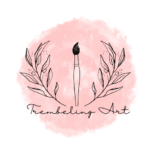Acrylic Mediums
It is helpful for an artist to learn how to use acrylic mediums in your painting. Acrylic mediums can be added to acrylic paint to give different effects.
Mediums can thicken or or thin paint, make it dry slower, add a glossy sheen or give your painting an interesting texture. There are a lot of acrylic mediums on the market and they vary slightly by brand.
Many artist use water as a medium to thin paint but too much water can dilute the binders in the paint and cause the paint to lift off your canvas. Acrylic mediums have the same acrylic base as your paint so lifting is less likely to happen.
Here are a few of the more popular mediums and how to use them in your art work.

**This page may contain affiliate links to products I have used or recommend. If you purchase something from this page, I may receive a small percentage of the sale at no extra cost to you. For more information **click here.**
Gel Mediums
Gel mediums are available in soft form and a thicker, heavy body type. They can be mixed with acrylic paint to extend the drying time and increase the transparency.
Thicker gel mediums thicken the paint and give you a finish more like oil paint, where the brushstrokes are visible. They can slightly extend the drying time of your paint.
Gel mediums come in a variety of finishes such as matte, semi-gloss or gloss. They can be used in place of gesso to prime a canvas. See my post on How To Gesso A Canvas.
Gel mediums can also be used as an archival glue when doing collage and decoupage.
** Use gloss on black or very dark paint as matte and semi-gloss can sometimes leave a milky film.
Texture Mediums
Texture mediums can add texture and interesting effects to your painting.
They are thick and best used with a pallet knife. Texture mediums can be used to make peaks, ridges or just about any shape on your canvas.
You can also make pronounced brush strokes using a stiff bristle brush. They can be transparent or opaque, matte or glossy.
Read the manufactures instructions on the jar before using.
Most brands now have a wide variety of texture mediums available containing sand, glass beads, ceramic stucco and more.
These can all be painted over when dry. With so many varieties available, a wide variety of techniques and special effects can be achieved.
The possibilities are endless.


Most manufacturers have information on how to use these acrylic mediums as well as how to videos and ideas on their web sites.
Flow Improver
Flow improvers or flow aids thin the paint without diluting the colour.
As the name implies, flow improvers improve the flow of your paint and decreases the friction of paint on canvas. You mix it with water, usually 10% flow aid to 90% water (read manufacturers instructions) and then mix into your paint.
Flow improvers can give you a stain, dye or watercolour effect without decreasing the strength of the pigment. Great for when you want transparent tints of colour, rather than a heavy opaque coverage.

Retarders
Retarders, or slow drying mediums slow down the drying time of acrylic paint. This is useful to enable blending, one of the hardest things to master with acrylic paint since it dries so quickly.
You usually mix this with a small amount of water (usually 15% retarder to 85% water, read manufacturer instructions).
Because I like to paint in many thin layers, I will sometimes add this to my brush rinse water giving me more time to blend all of my paint.
I also sometimes add the retarder water mixture to a spray bottle and lightly mist my work in progress.
The trick here is not to use too much or your paint will not dry and leave a sticky layer of paint permanently on your painting.
There are acrylic paints on the market that have an extended drying time. Golden, for example, has an Open Acrylic line that takes about 30 minutes to dry.
Be careful not to use retarder with these open paints because they could take weeks or months to completely dry.

Acrylic mediums do vary between manufacturers and each manufacturer may label the medium differently so it is really important to read the label, follow the instructions and test the medium before applying it to your painting.
I like to buy a new medium when it is on sale and then spend some time playing around with it to see what I can create. It’s a lot of fun!
I hope you found this post informative and if you have found new and interesting ways of using acrylic mediums tell me about them in the comments below.
I would love to hear about your adventures in creating.
Thanks for reading.





Hi.. Mariyln
I am from India…read ur story ..it was so inspiring…I m 32 years old..and was diagnosed with ‘Multiple Scecloris’ four years back..I also into paintings and after beating depression 2 months back…I realised that I wasted my 4 years by not giving justice to mt tapent..now I want to begin again…thnk u
Please reply…
Hi Amanpreet. I am sorry you have to deal with this. It can be very hard to deal with chronic illness. Depression is a big part of that unfortunately. Finding something that you can focus on and brings you joy is helpful. I am glad you have begun painting. I have found any form of art is therapeutic and gives me purpose and joy. I hope my web site will be helpful to you and you also might enjoy being part of our private Facebook group https://www.facebook.com/groups/trembelingart . You can ask questions, post your work or just enjoy looking at some wonderful artwork. I wish you many blessings. 😊
I am primarily an oil painter and have had mostly disastrous results when trying acrylic. I have tried to learn acrylic because of the hazards and smell associated with oils. I dislike the way acrylic dries so fast and seems to “grab” the canvas making it difficult to get a nice smooth brush stroke. With oils, you can “oil out” the canvas with medium to pre lubricate it, allowing the paint to glide, is this something that’s done with acrylic mediums?
Hi Damon
One of the draw backs of acrylics is the fast drying time making it hard to blend the paint. There are several types of mediums you can use to help slow the drying time and get a smoother blend. Misting with water both on your canvas and palette also helps. You can also have a look at my post How to Keep Acrylic Paint From Drying Too Fast. Here is the link I hope this helps.😊
I am hoping that a question will be answered for me. Can any mediums on the shelf do any kind of effects when u paint water like rivers, lakes
Thank you. This was so helpful for me.
Great reading & advice! Thanks.